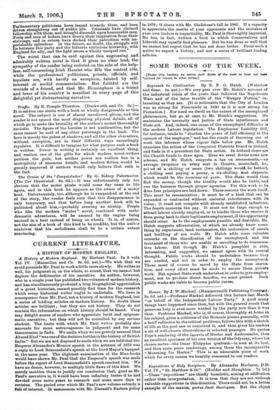SOME BOOKS OF THE WEEK.
[Under this heading we notice such Books of the weak as have not bus reserved for review in other forme.]
Reproach to Civilization. By E. F. G. Hatch. (Waterlow and Sons. Is. net.)—Wo may pass over Mr. Hatch's account of the industrial crisis of the years that followed the Napoleonic Wars and of the later trouble of the "Hungry Forties," in- teresting as they are. (It is noticeable that the City of London was as strong for Free-trade in 1820 as it is now strong for Protection.) Nor need we dwell on the causes of the unemployed phenomenon, but go at once to Mr. Hatch's suggestions. He maintains the necessity and justice of State interference and State aid. And, indeed, one cause of the unemployed difficulty is the modern Labour legislation. The Employers' Liability 13111, for instance, tends to "shorten the years of full efficiency in the opinion of the employer," and has the result of throwing out of work the labourer whose vigour falls below par. Mr. Hatch examines the action of the Congested Districts Board in Ireland, and finds in it a precedent for State action. In Ireland there are the Church funds to draw upon. Here we must devise some new scheme, and Mr. Hatch suggests a tax on amusements,—an average twopence on every seat in theatre, music-hall, &c., i-ed at a shilling or more (two shillings would be better), a shilling seat paying a penny, a six-shilling seat sixpence, which would be the terminus ad quem. The State would thus find the money, though the locality would also be liable, and run the business through proper agencies. For this work to be done four principles are laid down. Three concern the work itself. This must be remunerative ; it must be of a kind that can be expanded or contracted without material interference with its value ; it must not compete with already established industries, The fourth concerns the pay. It must not be largo enough to attract labour already employed, or to hinder those who receive it from going back to their legitimate employment, if the opportunity should occur. As to the employments possible and desirable, Mr. Hatch suggests afforestation, of which we already know some- thing by experiment, land reclamation, the restoration of canals and building of sea walls. Mr. Hatch adds some valuable remarks on the classification of the unemployed, and the treatment of those who are unable or unwilling to do remunera- tive labour. But though Mr. Hatch's pamphlet is able, interesting, and suggestive, we cannot agree with its central thought. Public works should be undertaken because they are needed, and not in order to employ the unemployed. These must of course be saved by the State from starva- tion, and every effort must be made to secure them private work. But against State work undertaken in order to give employ- ment, not to produce direct benefits, we must protest. Such public works are liable to become public curses.














































 Previous page
Previous page